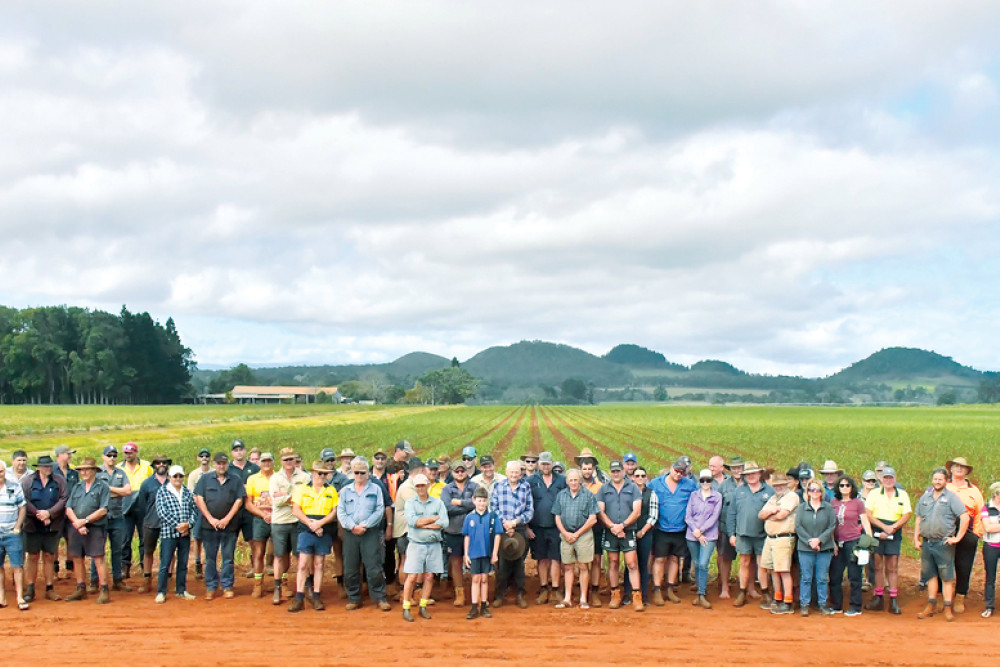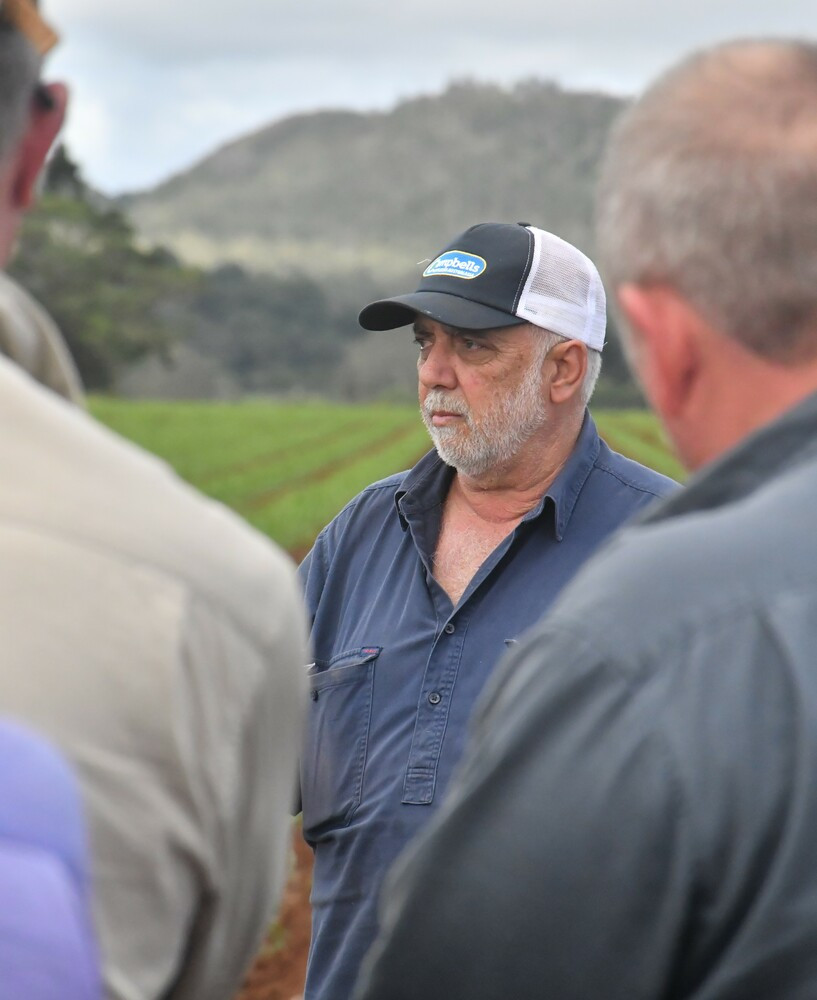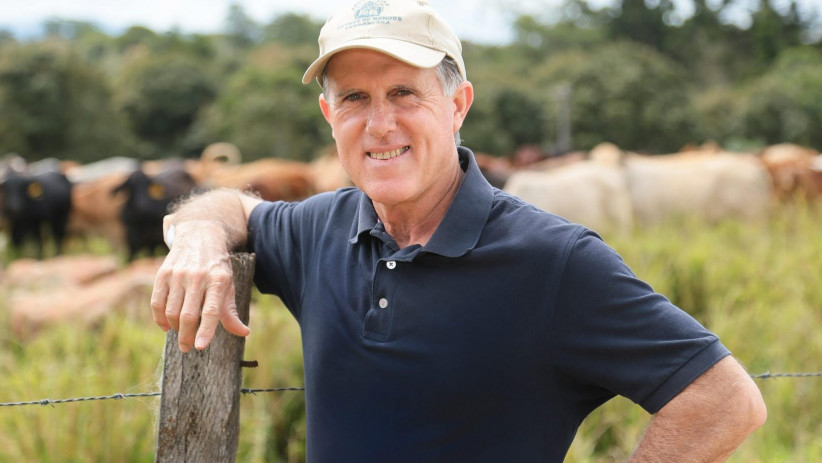General News
7 September, 2022
Growers voice anger over council rate hikes
THESE are the faces of Tableland farmers who gathered last week to vent their fury over massive rate hikes hitting their hip pocket, calling for Tablelands Regional Council to stop treating them like a cash cow.

Around 70 farmers turned up at a cane farm on Mark’s Lane to have their say, angry about the rise in their rates, with some saying they are paying more than $20,000 more this year while residential ratepayers, who enjoy all the facilities and services in towns, rose by an average of $8.
Peter Howe, of Rock Ridge Farming, said he pays close to $200,000 a year in rates but is receiving virtually no services from council – no water or sewerage infrastructure, no waste pick-up and, often, only dirt roads outside their properties which they say are graded once a year.
He claims that when he asked for a sign to be installed to alert motorists of where two dirt roads cross, officers told him it was not possible because the sign would have to be maintained.
“That means washing it once a year so we couldn’t even get a sign put in,” he said.
Peter Pensini, who has been farming in the area for 82 years, says he is now paying around $170,000 a year – $22,000 more than last year.
“It has been consistently going up around 25 per cent a year for many years,” he said.
Eddie Kochi, who addressed the crowd, said farmers were sick and tired of being a cash cow for council to raise revenue and Mayor Rod Marti was wrong when he says there is an inequity in rates between residential and rural landholders.
Mayor Marti said in his budget speech and in subsequent media reports that “council is commit-ted to containing rate rises for residential proper-ties in order to address inequity in council’s rates burden across the rating categories”.
“While residential properties account for 24 per cent of our land value, their rates contribution equates to 33 per cent of rates revenue. This rating inequity needs to be addressed over time and we’ve made a modest start with this budget,” he said.
Mr Kochi rejects this position, saying he b-lieves the disparity is actually the reverse of what the Mayor says.
“Rates should be based on a per capita basis, not based on the value of land – the majority of the population is in the towns and they get the majority of the services and facilities. To base it on land values is wrong, you can’t just apply a raw proportion like that,” he said
Farmers Fed Up

Tolga farmer Lawrence Masasso is another landholder who has seen his rates rise by a massive amount in the past nine years.
“My rates have risen by 73 per cent rise over the past nine years – they think we are a soft touch and they are hitting a small group of people who they think have the capacity to pay but at the same time, we cost council nothing (to service),” he said.
“We have done the heavy lifting for years now – while we get these big rises, residen-tial properties went up by an average of 0.11 per cent this year – we want the council to commit to rises of CPI or less and put that across the board.
“Show some faith in the industry and stop saying we are not paying our fair share.”
Mr Kochi said farmers had met with coun-cil around four years ago to try to get some comfort about future rate rises but nothing had happened.
“It all fell on deaf ears, they gave us lip service and it all came to nothing so here we are again,” he told the gathering.
“We need to present a united front to stop these continual rate rises, we can’t let this situation continue to escalate because the rotten truth is the valuations are not going to godown – rates will continue to get higher unless we do something about it.”
Council has cited significantly higher valuations for the rate rise, but farmers say council had tools at its disposal to soften the blow such as capping, adjusting the rate in the dollar or creating banding under Category F.
Mayor Marti has told The Express that council will look at banding in the next finan-cial year, but that is little comfort for many of the famers who are now stuck with very high valuations amidst economic conditions that have resulted in their inputs rising substantially, especially fertiliser, fuel, labour costs and electricity.
Richard Cuda, who farms potatoes and
grass seed near Tolga, said his rates had tri-pled in the past 10 years but his revenue had not.
“People see the price of vegetables in the supermarket and think we’re making loads of money but I’m getting almost the same price as I was getting before the price surge because these are locked in for a period of time,” he said.
“The fact is the council uses the valua-tions as ammunition to get every cent they can out of us – it should be a CPI rise for everyone.”
Many of the farmers spoke of how the ag-ricultural industry was the backbone of the local government area but was not being re-spected as such or reflected in the way they were being treated by the council.
“The economy here is built upon the ag-ricultural industry – we create jobs, inject money into local businesses that service the industry and if it wasn’t for us, there would not be companies setting up in this area,” farmer Guido Poggioli said.
“The council has also not factored in the price rises we are paying for inputs – they need a different way of apportioning the rates.”
Mayor gives commitment to review rating category

TABLELANDS Mayor Rod Marti has responded to farmers angry about massive rate hikes this year, giving a commitment that council will review rating categories before the next budget.
“It’s especially important for Category F where we have our ‘gold-plated’ agricultural land through to our poorest land,” he said.
“Currently the value extremes in Category F are not manageable, and it’s the highest value land that always goes up so that’s what we need to manage.
“And it may be that banding is the best tool, however we can’t adopt band-ing without first conducting a body of work and that’s what we’re doing.”
Responding to calls by the famers for rate rises to be based on CPI, Mayor Marti said in the first year of this term of council, the general rate was “frozen” however when new land valuations came out in 2021, council had to respond to very significant land valuation spikes occurring in categories F and G.
But he urged farmers to nominate for the council’s new Agricultural Advisory Committee so they could provide future input on rates and broader council priorities and investments.
With famers also demanding that water licences not be considered as part of the valuation of their land, Mayor Marti said council
was prepared to advocate to the Department of Land and Natural Resources on their behalf.
“Council will make representations to the department to remove water from land values,” he said.
“The attachment of water to land values dramatically increases the total value and there’s the added inequity of water licences being singled out over other entitlements.
“We already have the most expensive agricultural land and water in the State, we can’t keep finding ways to increase values.
“Valuations are not linked to on-farm productivity, they’re linked to property sales which are very different things.”


